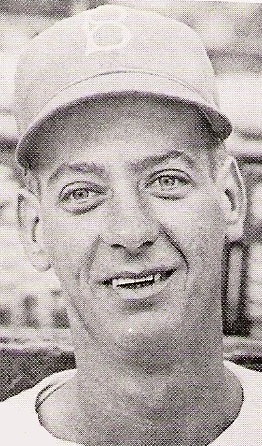Only a small percentage of minor league baseball players ever get a chance in the big leagues. Of those who do, a minority will participate in a World Series game. Taking part in 5 World Series games made Hank Behrman a hometown sports hero.
Behrman was born in 1921 in Brooklyn but his family had moved to Maspeth during his youth. He attended Grover Cleveland High School and played on their varsity baseball team. In 1940, the Brooklyn Dodgers held a tryout at Ebbets Field that Behrman participated in and he was signed as a pitcher. He was sent to Florida to play “A” ball, and his winning record there got him promoted to the AAA Durham Bulls in 1942, where he pitched a no-hitter.
After the 1942 season was over, Behrman joined the US Army. He was stationed at an army air base in Nebraska for most of the remainder of World War II, but in May 1945, his regiment was sent to France. He was brought home in August and discharged the following January. Still under contract with the Dodgers, Behrman was sent to Montreal, their AAA club, where he met and played alongside Jackie Robinson for the first time. Robinson would famously break baseball's color barrier the following spring when he took to the field as a Dodger for the first time on April 15, 1947.
Behrman’s biggest year was 1946. Dodgers’ farm team manager Branch Rickey, Jr. was so impressed with this young pitcher that he publicly expressed confidence in him and predicted a successful career. The Dodgers brought Behrman up as a starter, but over the course of the year manager Leo Durocher felt he would be better suited as a relief pitcher. In that role, he excelled. The St. Louis Cardinals won the National League pennant that season, but the Dodgers expected more great things from Behrman the following year. Sportswriters dubbed him “The Long Island Nature Boy”.
During spring training in 1947, Behrman hurt his arm. He also married his wife, Ellen, and bought a home in St. Albans, Queens that year. Unfortunately, he became known more for his off-the-field hijinks than his pitching skills and was traded – with conditions – to Pittsburgh with 4 teammates that May. He did poorly with the Pirates, and 6 weeks later they returned him to the Dodgers, who had no choice under the agreement but to cough up $25,000 to take him back. Over the course of the 1947 season, Hank pitched in 40 games and had a 5-3 record. His ERA was a shaky 5.48, but the Dodgers won the pennant that year and entered the World Series – against their crosstown rivals, the Yankees.
Excited Maspeth residents gathered around their radios to listen to the games and root for their hometown hero. To think that not only had a well-liked local boy made it to the major leagues but that he was playing for a local team in the ultimate baseball contest was amazing, indeed! Behrman did manage to pitch in 5 of the 7 games of the World Series, all in relief, for a total of 6 1/3 innings in which he gave up 9 hits. The Dodgers lost the Series that year, but they were honored outside Brooklyn Borough Hall with a reception and parade for winning the National League pennant.
Behrman's tenure with the Dodgers was marred by a paternity suit, drunken escapades off the field and chronic lateness and absences, which may have been partially due to Behrman's soreness at being forced to pitch relief instead of start. In 1948, the Dodgers demoted Behrman by sending him back to AAA Montreal. He straightened himself out there, and returned to the majors to pitch relief in 34 games. His record was 5-4 with an ERA of 4.05. The Dodgers did not make it to the World Series that year.
Branch Rickey, Sr. still held out hope that Behrman would become a great asset to the Dodgers, but he wanted to keep an eye on him. In January 1949, Rickey hired Hank to assist with grounds-keeping work, preparing Ebbets Field for the upcoming season. The wage was 90 cents an hour and the work was for 8 hours a day. It kept him on the straight and narrow, which pleased Rickey. However, their relationship soured after Hank arrived in Florida and announced that he would not report to spring training. Rickey traded him to the Giants prior to the start of the regular season. That year, the Dodgers would once again make it to the World Series, but this time without Behrman. They lost to the Bronx Bombers in 5 games that time around.
For the Giants, Hank pitched in 43 games and his wish was partially granted – he had 4 starts during the 1949 season. His record that year was 3-3 and he had a 4.92 ERA. Although he reported for spring training in 1950, he had several injuries that prevented him from playing in the regular season, and the Giants released him to the Pacific Coast League. Hank floated around the PCL and the MLB minors until 1953, when he could no longer play baseball. In 1955, the Dodgers finally completed the monumental task of beating the Yankees in the World Series, with Hapless Hank having no choice but to watch all the excitement unfold on his TV at home.
Maspeth may one day see another of her local boys make it to the major leagues. Hopefully our next sports star will avoid the pitfalls that tripped Hank up. As for Mr. Behrman, after baseball, he worked for decades as a delivery truck driver and became a family man, having raised 5 children. He died in 1986 at the age of 65 after suffering complications brought on by triple bypass surgery. He is buried at Calverton National Cemetery.



